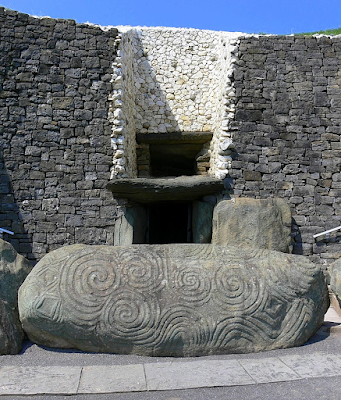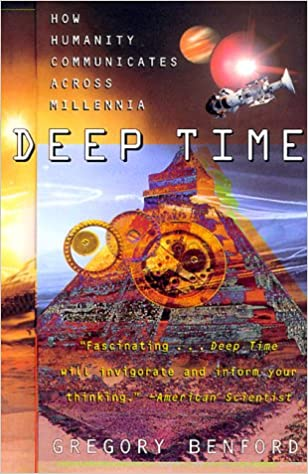History is a mystery, and I think that's why there's a number of us - Rob Lopresti, Doolin' Dalton, myself, and others - who are fascinated with history, archaeology, and all that old, old stuff.
Rob Lopresti wrote a great blog post a couple of weeks ago about hypnogagia, literal patterns that your eyes see just before you sleep (or when you shut your eyes extremely tight: mine are black patterns on a yellow background), and their relationship to the symbols at Newgrange burial chamber in Ireland. (HERE) I've had hypnogagia all my life - in fact, last night I was awakened by a rattling, like of bones in a cup; twice.
And Rob's piece yesterday was on archaeologists' interpretations of what they find, which (especially in the olden days) sprang more from their own ideas of what they should find and not what was already there. And this post is sort of along the same lines - stick with me on it.
A while ago, I wrote a blog post on Paleolithic Languages (Older Than You Think), where paleolinguists have determined that there are 23 ultra-conserved words, "proto-words," that don't just still exist in almost all current language families, including Inuit-Yupik, but still sound remarkably alike. They go back at least 15,000 years, and are a window into a time of hunter-gatherers painting in Lascaux and trying to survive the end of the Younger Dryas (the next-to-the last mini-Ice Age):
thou, I, we, ye, who, what, this, that, not,man/male, mother, hand, old, black,give, hear, pull, flow, spit,bark, fire, ashes, worm
BTW, I've always wondered what worm they meant– a snake (like in the Newgrange / Knowth sculptures)? A garden worm? The dog's worms? The worm you put in uisce beatha (whiskey) to make it stronger?
So, a very long time ago, almost everyone in Asia, Africa, the Middle East, and Europe spoke the same language. Or at least the same trading language. The exceptions might be Australia (which had been cut off from the rest of the world back around 50,000 BCE) and the Americas, about whose isolation from the rest of the world is undergoing more and more under debate.
NOTE: Everyone talks about the Bering Land (really Ice) Bridge being the way that people got from Asia to Alaska to drifting down the Americas to Tierra del Fuego, BUT – there's more and more evidence that people settled across the Americas earlier than is allowed by that theory. (Latest evidence is 23,000 year old footprints at White Sands, New Mexico.) Plus they'd have been freezing all the way.
Much more likely is by boat. Our modern world is obsessed with land travel because (unless you cruise a lot) that's what we do. Planes, trains, and automobiles. But before the combustion engine, most major hauling and travel was done by boat, barge, canoe, ship, skiff, etc. And Thor Heyerdahl, for all his quirks, proved you could sail from South America to the Polynesian islands.
And I say, why not from / to China? For one thing, while Africa and Europe see a human in the Moon, Chinese, Aztec, and much Native American lore sees a Rabbit in the Moon.
But the real mystery isn't how a tiny core of hominids communicated with each other via a common language. The real mystery is why, once the Last Glacial Period (c 115,000-11,700 years ago) ended, all across the globe - husbandry and agriculture begin? By 9,000 BCE, From the Fertile Crescent to Papua New Guinea to the Yangtze Basin, people we have hard-core evidence of humans growing crops. Raising domesticated animals for food. And that's probably not the true date of the beginning the "revolution", because pottery for storage and processing (including the fermenting of certain grains, i.e., alcohol! Something to drink, people!) dating back 20,000 years ago has been found in China and Japan. We don't know the half of it.
So: how did everyone know what to do, in such widely disparate places, once the weather let up? We don't know. One Hundred Thousand Years of Ice is going to grind up a lot of evidence that we will simply never find. But we have the oral traditions...
Well, my old friend and frequent thinking / drinking buddy John Franklin and I have discussed this many a long hour, and we both believe that
(1) Humans (of any species / subspecies) have been in touch with each other for a very long time.
(2) Before the Last Glacial Period (c 115,000-11,700 years ago), there were technologically advanced hominid civilizations. For all I know, advanced enough that they caused a nuclear winter, because that is apparently what civilizations do: we grow and grow and grow and then one day we grow ourselves right out of our habitats. As Jared Diamond once wondered, what was the man who cut down the last tree on Easter Island thinking? Probably about the [equivalent of] money he was about to make selling it.
(3) Anyway, over 100,000 years ago, something happened, and what followed was 100,000 years of Ice.
But we have the stories of what came before: stones walking themselves to their sites (Egypt and Easter Island)! People flying through the air on magic carpets! Rings / stones (Solomon's Seal) that allowed people communicate with the animals and around the world! Stones that talk! And the myths / fairytales!* Those are memories, passed down for so long they became myth, of technology that used to exist. Just as in 10,000 or 100,000 years people (should the human race survive) will remember planes, cell phones, Zoom meetings, etc., as stones, rings, rooms, etc.
John Franklin says the civilization(s) undoubtedly knew what was coming. So, you're facing extinction by massive climate change, and it's a crapshoot as to how long it will last and who's going to survive it. What do you do? Give up? Or try to out ways to condense important information to something that will be understandable for literally millennia, and training people how to pass it along?** (Of course, there's always denial... If you don't think about it, Maybe it will go away.)
And we've discussed what powered these ancient civilizations. Most of technological history has been humans trying to replace muscle power with anything else that will work. Windmills, waterwheels, levers & fulcrums, railroads, cars, computers, etc. But to run these things you have to have some kind of fuel. So what did they use 100 millennia ago?
Franklin says that the best way to figure out what fueled pre-Last Glacial Period technologies is to look at what's considered rare but valuable today. He plumps for gold. Gold is an excellent conductor and holder of electricity. I remember reading once that the Ark of the Covenant could well be a description of how to build a battery:
“First let them make a Chest using acacia wood: make it three and three-quarters feet long and two and one-quarter feet wide and deep. Cover it with a veneer of pure gold inside and out and make a molding of gold all around it. Cast four gold rings and attach them to its four feet, two rings on one side and two rings on the other. Make poles from acacia wood and cover them with a veneer of gold and insert them into the rings on the sides of the Chest for carrying the Chest. The poles are to stay in the rings; they must not be removed. Place The Testimony that I give you in the Chest. Now make a lid of pure gold for the Chest, an Atonement-Cover, three and three-quarters feet long and two and one-quarter feet wide. Sculpt two winged angels out of hammered gold for either end of the Atonement-Cover, one angel at one end, one angel at the other. Make them of one piece with the Atonement-Cover. Make the angels with their wings spread, hovering over the Atonement-Cover, facing one another but looking down on it... I will meet you there at set times and speak with you from above the Atonement-Cover and from between the angel-figures that are on it, speaking the commands that I have for the Israelites. (Exodus 25:10-22, The Message Bible)
I pointed out to Franklin that the Ark is empty, except for "the Testimony," and usually a battery has more technical stuff in it (look it up yourself) than a scroll.
His reply: "Who says 'the Testimony' was a scroll? That could be a code word for some practical knowledge. And those aren't angels: they're cherubim. Fairly frightening creatures - four faces, two wings, definitely nonhuman. Transmitters? Receivers? Perhaps. Consider that no one's supposed to touch the Ark, except the specially trained Levites, and even they're only supposed to carry it using poles overlaid with gold. No hands on. Uzzah, the one man we know of who reached out and touched it dropped dead. Sounds like electrocution to me."
I've heard worse theories.
So say he's right, and before the Last Glacial Period, their technology was fueled by gold. It would explain why the racial memory of gold as the source of power and wealth. Granted, it's beautiful, but it's not especially useful... Anymore. And yet, since ancient times, alchemists have tried to transmute lead into gold (Zosiumus of Panopolis, c. 300 CE provides the earliest record to survive) via the philosopher's stone, which is / was ...???? Who knows?
It would also explain why gold today is generally hard to find, in low concentrations, and expensive to process - the Old Old Ones*** used most of it up.
Franklin: "So, imagine a world, ten thousand, fifty thousand years from now, where there are whispers of a powerful energy source, that gave immense wealth and power to those who could control it. A dark energy, a black energy, dark oil, night coal, that harnessed the dark forces of the universe and gave unimaginable power. And there are still remnants of it: the Tears of Saturn and the Blood of the Moon, the Night Gifts are horded by Kings. The nobility and wealthy wear it, in their hair, on their faces. Priests sacrifice it to the gods, kings are embalmed in it, buried in caskets with it. A vial of it is immensely precious. A necklace of jet or obsidian is like diamonds today. And no one has any idea that these once fueled an entire civilization. They just know it's valuable. Powerful."
"Okay," I said. "So they revere oil and coal. But what are they using for fuel?"
"Something we've never thought of, of course." Franklin said. "Depends on what survives the Pyrocene."
* And all the old myths. And some new ones. There's a Great Flood in every oral tradition, along with a blind king, a Cinderella, and the oldest are of a blacksmith cheating the devil.
** BTW, Gregory Benford's non-fiction Deep Time: How Humanity Communicates Across Millennia (1995) is worth a read. I recommend the first part (Ten Thousand Years of Solitude), about a government project he was involved in, trying to figure out how to communicate the danger of buried radioactive material to people far in the future. The last part (Stewards of the Earth) is about what future peoples (say, 100,000 years from now) will think of what we leave behind.
*** With apologies to Cthulhu…
Now for some BSP:
Josh Pachter's Paranoia Blues is one of the five finalists for the Anthony award in the Best Anthology category, and Ed Aymar's "Still Crazy After All These Years," from it is a finalist in the Best Short Story category! And I am honored to have "Cool Papa Bell" in it!
Available at https://downandoutbooks.com/bookstore/pachter-paranoia-blues/
And on Amazon HERE




Eve, in reference to your bit about what was happening in the Americas, researchers have determined that rock carvings in Arizona date back to the Shang Dynasty. NOTE: The Shang Dynasty and its language went out of business in China in 1046 BC. That's only 3,000 years back, but it beats Columbus and the Vikings. Yep, history is still being discovered.
ReplyDeleteAbsolutely. And they used to say that humans only got to Central America in the 4000s or so - but now, 23,000 year old footprints at White Sands...
DeleteMy grandfather was a gold prospector in Alaska. He panned the gold that my grandmother's wedding ring was made of. The ring can't be worn for too long because it's 24kt & it softens & loses its shape. The Donald's grandfather lived in the same area at the same time, but he didn't pan for gold. He ran rooming houses & houses of ill repute. What if history had turned out a little differently & "my" grandfather had been the one who got filthy rich?
ReplyDeleteSome of the fundies claim the earth has only been in existence for 4,000 years. Evidently there are adults who believe this.
Cool post, Eve. The good news: they can't stamp out magic. The bad news: they can't stamp out denial.
ReplyDeleteI know. If only we could stamp out denial...
DeleteThanks for the mentions, Eve. Paleolanguage fascinates me. I am surprised that water isn't on that list of ancient words, since we have wasser, agua, aqua, etc. I have mentioned before Barber's book When They Severed Earth From Sky. The thesis of the book is that preliterate society use myth to pass on important information. Classic example: The Native Americans in Oregon have an old story saying you must never go near Crater Lake because there is a man under it who gets angry and throws fire. Crater Lake is a volcano - but it hasn't erupted in thousands of years...
ReplyDeleteYes, in a future life I plan to be a paleolinguist who raises sheep. Seriously. Here in South Dakota, the Native Americans have always called the Badlands - the Badlands, because it's a very treacherous landscape, with little water, etc.
DeleteFrom Jerry Sweeney because an unknown Google setting won't let me past as other than anonymous. E. E. Smith's first entry in the Lensman series provided an alternative explanation for civilization's rise and fall. https://en.wikipedia.org/wiki/Lensman_series
ReplyDeleteEve, fascinating as always! Melodie
ReplyDeleteEve, I grew up in the heart of agriculture, which included a bit of history. The claim was made that some crops, in particular maize (corn in North America) aren’t able to survive without human intervention– tilling, planting, fertilizing, cultivating, harvesting, and– until this time of genetically altered crops– tucking away seed for a new year. The earliest ancestor of corn (again, using the North American term) isn’t recognizable as such, rather it looks more like rye, oat, or wheat.
ReplyDeleteEarly humans must have quickly realized spitting out seeds of some fruits and vegetables resulted in new plants growing near the refuse pile. During migrations, especially when husband wouldn’t stop at a prehistoric McDonald’s, a pocketful of seeds would have been easy to carry. Possibly when early man had killed the last mammoth, early wife stepped up with her discovery that kept the clan from starvation.
Battery… sounds more like a capacitor (condenser) to me. When you walk on new carpet and build up static electricity… you’ve turned yourself into a capacitor.
Batteries are simple things, generally requiring two different metals (or carbon) and a chemical electrolyte. Thus two out of three battery ingredients are missing. But the description includes everything to build a foil capacitor.
Both store electricity, batteries long term, caps short term.
Primitive humans had all the materials to make either batteries or capacitors, but they didn’t have an application… say, a motor or a light bulb. Once a practical use for stored electricity was figured out, then attention turned to batteries, which have proven difficult to make efficient. That’s where the world stands, mining lithium, cobalt, and other materials in a search for an electrical holy grail.
P.S. Congratulations for the nominations!
ReplyDeleteLeigh I bow to your superior knowledge of what the Ark was - capacitor rather than a battery - but it does lead to the question who came up with it and why. Meanwhile, megaliths (Catal Huyuk and Gobekli Tepe among others) predated the Agricultural Revolution. We don't know how things came to be - just that (as I said in another blog post) humans have been mourning the loss of the Golden Age of hunter-gathering (?) ever since we have records.
ReplyDelete